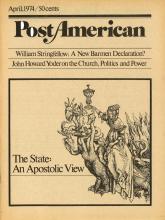The very way the issue is framed furnishes temptation to suppose that history repeats itself in an eventful manner, so that the current American political circumstances are beheld as constituting a recurrence of those in Germany forty years ago and are, in turn, thought to warrant a response analogous to that of the Barmen Confession.
To succumb to this temptation stereotypes history. It reduces history to redundancy. It represents a modified predestinarianism which deprives creatures--both persons and principalities--of responsibility for decisions and actions at the same time that it narrows and ridicules the militant judgment of God in history. It is, as a conception of history, categorically unbiblical, and, furthermore, it is dull.
(1) Barmen as Precedent
For all of that, the present American crisis as a nation is sufficiently bewildering to entice many citizens to treat history in just such a simplistic, imitative manner. In this vein, Nixon is compared with Hitler; America is named fascist; Watergate is equated with the Reichstag fire.
I reject this view of history as false, misleading, escapist. I esteem history as ambiguous, versatile, dynamic.
I do not imply that there are no appropriate comparisons to be ventured or no significant similarities to be noticed. But I find that history “repeats” itself as parable, rather than analogue, and that the edifying similarities are topical rather than eventful having to do with perennial issues embodied in changing circumstances from time to time instead of with any factual duplication transposed from one time to another.
Read the Full Article

